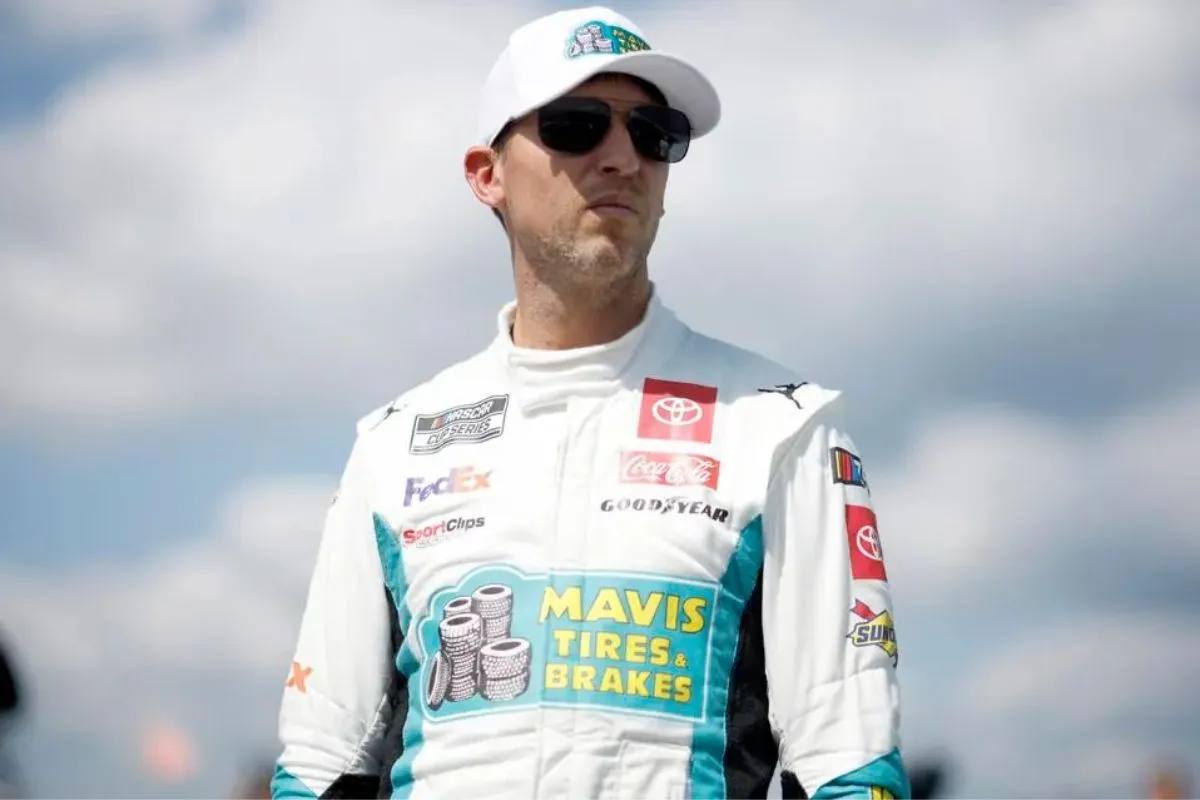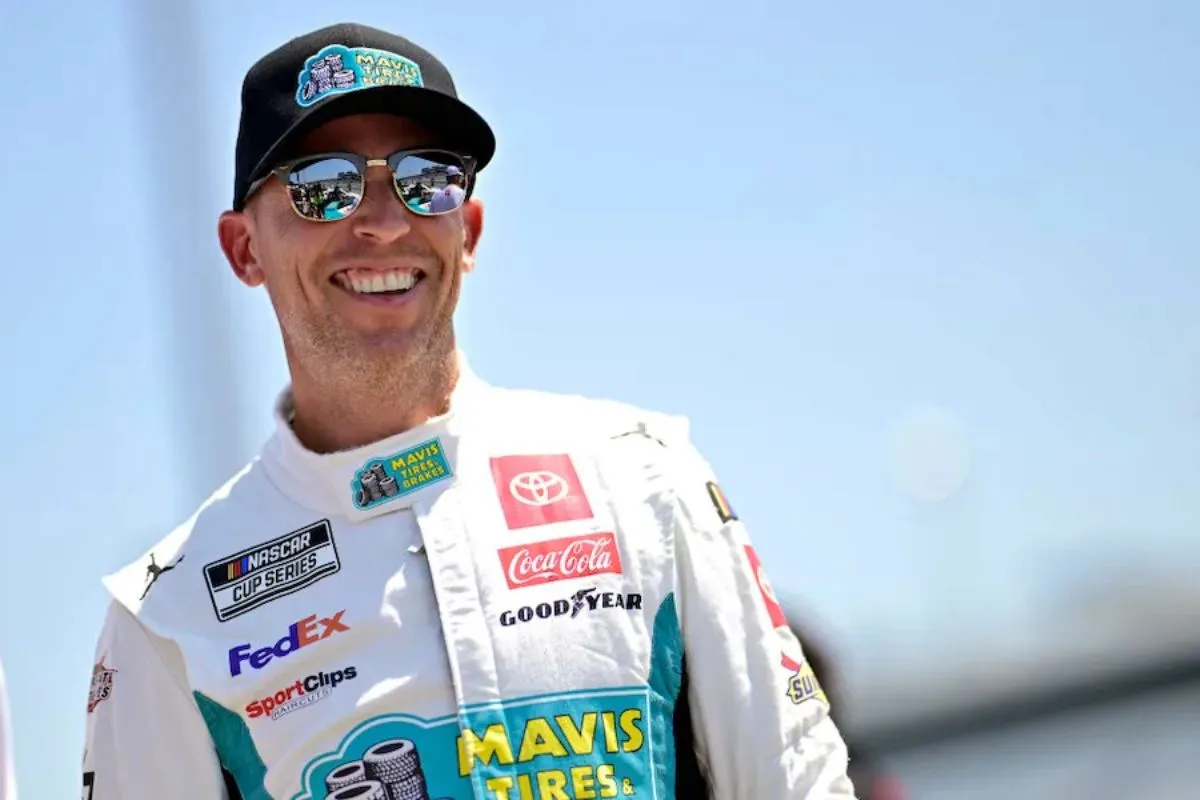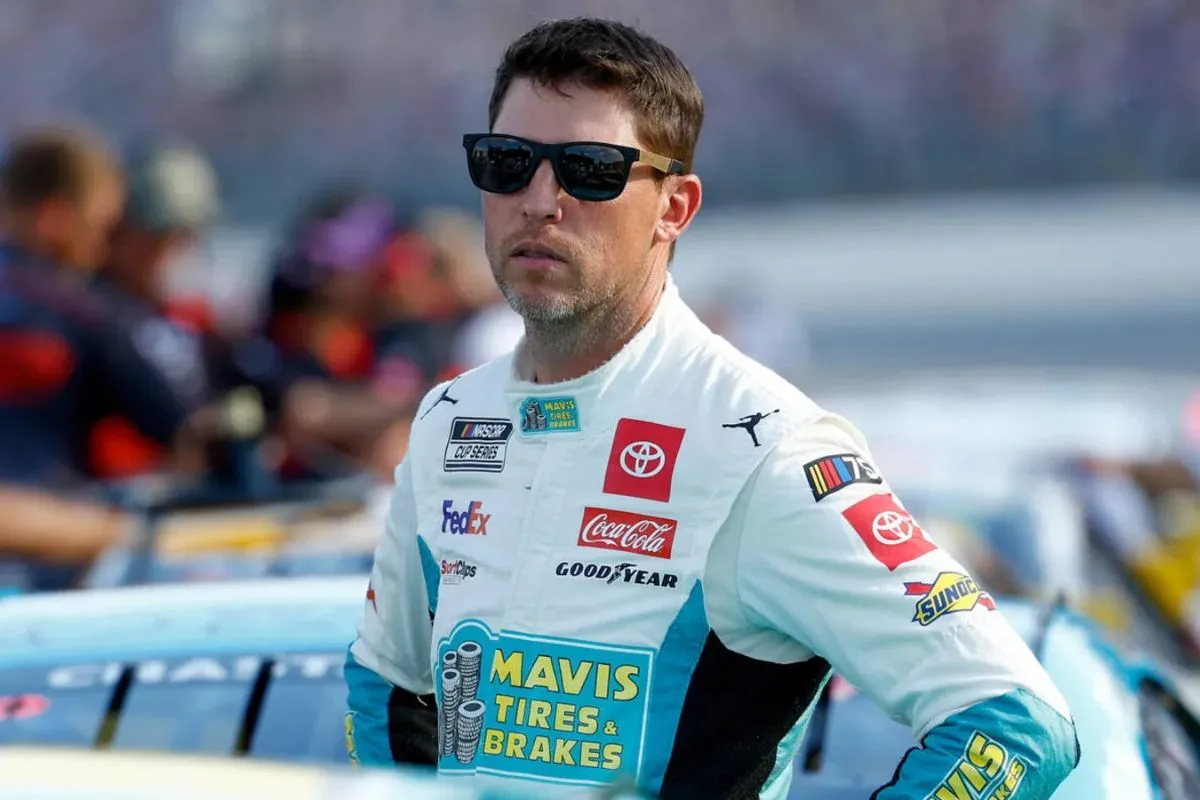Denny Hamlin Calls Out Goodyear: Denny Hamlin’s critique of Goodyear in the aftermath of the Bristol tire controversy has brought to light an important opportunity for reevaluation and enhancement of safety protocols in NASCAR. The lead-up to the race saw intensified concerns over tire wear, with a switch to resin causing challenges for the drivers in adjusting to the altered track conditions. Hamlin’s victory amidst the tire disaster highlighted the championship implications at stake, sparking debates within the NASCAR community over the safety and performance implications of the tire situation.
Hamlin’s comments and plea to Goodyear emphasize the importance of addressing tire issues promptly and transparently, signaling a need for adaptability and safety prioritization in the face of unexpected challenges.
Key Takeaways
- Hamlin criticized Goodyear for Bristol tire issues.
- NASCAR race at Bristol marked significant teaching moment.
- Tiregate incident highlighted importance of tire safety.
- Goodyear’s handling of tire problems under scrutiny.
- Hamlin’s comments sparked discussions on racing safety.
The Lead-Up to the Race
In the lead-up to the race, anticipation mounted as concerns over vital tire wear intensified, casting a shadow over Denny Hamlin’s imminent bid for his 52nd Cup Series victory at Bristol. The focus shifted to tire performance, with Goodyear’s decision to switch from the synthetic PJ1 compound to resin for Bristol’s return to concrete becoming a pivotal point. This change in track conditions posed a significant challenge for drivers, as evidenced by P2 qualifier Josh Berry and seasoned racer Joey Logano struggling with tire management during practices and qualifying sessions.
Driver strategies were heavily influenced by the unpredictable tire wear, forcing teams to adapt their approach to pit stops and overall race tactics. The need to balance speed with tire preservation became paramount, with teams strategizing on how to best navigate the demanding Bristol track without compromising performance due to excessive tire degradation.
As the race day approached, the uncertainty surrounding tire behavior persisted, creating a sense of unease among the drivers and teams. The eventual race outcomes would depend not only on raw speed and skills but also on the ability to effectively manage tire wear throughout the thrilling event. The stage was set for a race where pit stops would play a vital role in determining success, adding complexity to an already challenging competition.

Hamlin’s Victory Amidst Tire Misery
Despite facing significant tire issues, Denny Hamlin emerged victorious at Bristol’s NASCAR event, securing a monumental win for both himself and Coach Gibbs’ team. The race was not without its challenges, as tire drama occurred throughout the event, adding complexity to an already intense competition. Hamlin’s ability to navigate these difficulties and claim the checkered flag showcased his skills and determination on the track.
- Championship Implications: Hamlin’s win at Bristol could have significant implications for the championship standings, solidifying his position as a top contender for the title. The points accumulated from this victory could prove pivotal as the season progresses.
- Driver Frustration: The tire issues experienced by the drivers, including Hamlin, likely led to frustration and added pressure during the race. Managing these emotions while maintaining focus and performance is a reflection of the mental fortitude of NASCAR drivers.
-
- Controversial Finish: The race’s conclusion amidst the tire debacle might spark debates within the NASCAR community regarding the role of tire management and the impact on race outcomes. The controversy surrounding the finish could lead to further discussions and adjustments in future events.
- Racing Safety: The tire issues at Bristol raise concerns regarding racing safety. Ensuring the durability and reliability of tires is essential to protecting the drivers and enhancing the overall safety of NASCAR competitions. Addressing these issues is essential for the well-being of all participants.
View this post on Instagram
“There’s just no grip down there, and that’s why we are just so much slower, is that we don’t have PJ1 this time. But, everyone thought, ‘Hey once we get all the cars out there, get some heat going, we’re going to rubber in the track, It’s going to get better.’ And it just never rubbered in.”
Hamlin’s Comments on the Tire Situation
Hamlin’s assessment of the tire situation at Bristol following his P3 qualifying position sheds light on the challenges faced by drivers due to the altered ‘compound mixture‘ and absence of PJ1 on the track. His comments on the lack of grip highlight the impact of track conditions on race strategy. The Goodyear controversy at Bristol has brought the tire issues to the forefront, affecting driver performance and adding an element of unpredictability to the race.
Hamlin’s humorous yet insightful remark about someone potentially tampering with the rubber mixture underscores the frustration felt by drivers grappling with the Bristol challenge. The absence of PJ1, a substance typically used to enhance grip, has further complicated matters, making it difficult for drivers to find the desired traction on the track. Hamlin’s disappointment at the track not rubbering in as expected reflects the importance of track conditions in optimizing performance.
The altered compound mixture has forced drivers to adapt their race strategies, requiring them to navigate the track with reduced grip levels. This adjustment poses a significant challenge, as drivers must find ways to maintain speed and control amidst the evolving track conditions. Hamlin’s comments serve as a reminder of the intricacies involved in NASCAR racing and the need for adaptability in the face of unexpected challenges.
“I think someone p*e-p*ed in the Goodyear rubber mixture I’m not really sure, but it’s definitely really different…”
Hamlin’s Plea to Goodyear
Amidst the tire controversy at Bristol, Denny Hamlin’s call for transparency from Goodyear shows the critical need to investigate the issues surrounding the altered tire mixture and its impact on NASCAR racing. Hamlin’s plea highlights the importance of holding Goodyear accountable and ensuring the safety and integrity of NASCAR events. The following points shed light on the significance of Hamlin’s stance:
- Goodyear’s Responsibility: Hamlin’s request for transparency places the spotlight on Goodyear’s responsibility in guaranteeing the quality and performance of the tires supplied for NASCAR races.
- Tire Compound Complexity: The mention of various materials used in the tire compound raises questions about the intricate composition of these essential components and their implications on race outcomes.
- NASCAR’s Response Imperative: Hamlin’s call serves as a catalyst for NASCAR to respond promptly and effectively to address the concerns raised by drivers and teams regarding the tire issues.
- Racing Safety Paramount: The emphasis on investigating the altered tire mixture shows the paramount importance of prioritizing safety in NASCAR to protect the drivers and enhance the overall racing experience.
- Manufacturer Transparency Essential: Hamlin’s plea emphasizes the necessity for manufacturers like Goodyear to maintain transparency in their processes and materials to build trust and confidence within the racing community.
Plenty to say about that one… ⚔️
— Dirty Mo Media (@DirtyMoMedia) March 18, 2024
NEW ACTIONS DETRIMENTAL WITH @dennyhamlin OUT NOW ⬇️
Apple: https://t.co/2A7ehHYx2F
Spotify: https://t.co/Luk639Q5c2
Web: https://t.co/apg10BSJLL pic.twitter.com/EcmST8sLjq
Hamlin’s plea to Goodyear signifies a pivotal moment for NASCAR to reevaluate its protocols, guarantee accountability, and prioritize safety in the sport.
“I have this plea to whoever was responsible for the mixture of the Goodyear tires. Don’t try to cover it up. Whoever’s in charge at Goodyear needs to go and say ‘Okay, we’re not firing anyone, we just want to know what happened.’ Because I believe this could be the biggest teaching moment in the history of NASCAR.”
Goodyear’s Response and Looking Ahead
Following the recent statements from Goodyear’s tire chief regarding the tire issues at Bristol, the NASCAR community anticipates a thorough response from the manufacturer and looks ahead to potential implications for the upcoming race at COTA. Goodyear’s stance on the matter has been clear, with Greg Stucker dismissing track temperature concerns and highlighting that the Truck Race experienced minimal tire cord issues. As discussions started, potential solutions to guarantee tire safety will be under scrutiny, especially considering the upcoming race at Circuit of The Americas (COTA) with its unique challenges.
In response to Goodyear’s position, fan reactions have been mixed, with some expressing concerns over safety while others await further clarification from NASCAR. The governing body’s response to Goodyear’s statements will be pivotal in addressing the community’s apprehensions and ensuring that adequate measures are in place for the upcoming races.
To provide a detailed overview, the table below outlines key aspects related to Goodyear’s response and the implications for the upcoming race at COTA:
| Aspect | Details |
| Goodyear’s Stance | Dismissed track temperature concerns and noted minimal tire cord issues in the Truck Race |
| Potential Solutions | Discussions ongoing to enhance tire safety measures, especially for the unique challenges at COTA |
| Fan Reactions | Mixed responses from fans, with some emphasizing safety concerns and others seeking clarity |
| NASCAR’s Response | Awaited response from NASCAR to address community concerns and ensure race safety |
| Tire Safety | Focus on guaranteeing tire safety paramount, particularly in preparation for the COTA race |

News in Brief
Denny Hamlin’s critique of Goodyear at Bristol presents a noteworthy learning opportunity for NASCAR. The tire controversy highlighted the significance of tire safety and dependability in racing.
Hamlin’s appeal for enhanced quality control from Goodyear should not be overlooked, as it impacts the safety and integrity of the sport. Moving forward, it is vital for Goodyear to address these issues to prevent similar incidents in the future.
Our Reader’s Queries
Q: How many wins does Denny Hamlin have?
A: Despite his impressive track record with 52 wins in the Cup Series, Denny Hamlin faced yet another round of boos from the crowd as he celebrated his performance at Bristol Motor Speedway. The mixed reactions highlight his polarizing status in the sport.
Q: How long has Denny Hamlin been racing in NASCAR?
A: Denny Hamlin made his NASCAR national series debut back in 2004 at Indianapolis Raceway Park, competing in a NASCAR Camping World Truck Series event.
Q: How many daytonas has Denny Hamlin won?
A: Despite his ups and downs, Hamlin maintains his status as a formidable competitor in NASCAR. His achievements speak for themselves; with three Daytona 500 victories under his belt, only Richard Petty (seven wins) and Cale Yarborough (four) have surpassed him in this prestigious race. Hamlin’s sights are set on reaching 60 career victories, currently standing at an impressive 51 wins, reflecting his unwavering determination and commitment to success on the track.
Also Read: Denny Hamlin Reveals NASCAR’s Horsepower Truth: Fans Beware!

